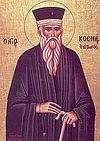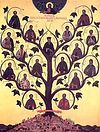

| Previous day | Next day |
| Old Style
August 24
|
Friday |
New Style
September 6
|
|
11th Week after Pentecost.
Tone 1.
Fast Day. |
Wine and oil allowed.
|
![]() Hieromartyr Eutychius, disciple of St. John the Theologian (1st c.).
Hieromartyr Eutychius, disciple of St. John the Theologian (1st c.). ![]() Translation of the relics of St. Peter, metropolitan of Kiev and Moscow (1479).
Translation of the relics of St. Peter, metropolitan of Kiev and Moscow (1479).
Martyr Tation, at Claudiopolis (305). Virgin- martyr Kyra of Persia (558). St. George Limniotes the Confessor, of Mt. Olympus in Bithynia (ca. 716). New Hieromartyr Cosmas of Aitolia, Equalto- the-Apostles (1779). St. Arsenius, founder of Komel Monastery (Vologda) (1550). New Hieromartyr Maxim Sandovich, priest, of Lemkovina, Poland (1914). St. Aristocleus, elder, of Moscow and Mt. Athos (1918). Appearance of the Most Holy Theotokos to St. Sergius of Radonezh (ca. 1385).
New Hieromartyrs Michael Voskresensky, priest (with 28 other martyrs) (1918), New Hieromartyr Seraphim (Shakhmut), archimandrite, of Grodno (Belorussia) (1946).
Icon of the Most Holy Theotokos “Petrovskaya” (“Of St. Peter of Moscow”) (ca. 1306).
St. Ouen (Adouen), archbishop of Rouen (Gaul) (ca. 683). Hieromartyr Athanasius II, patriarch of Jerusalem (1244). Translation of the relics of St. Dionysius of Zakynthos, archbishop of Aegina (1716). St. Serapion the Wonderworker, abbot, of the Monastery of St. John the Baptist at Gareji, Georgia (1774).
Thoughts for Each Day of the Year
According to the Daily Church Readings from the Word of God
By St. Theophan the Recluse

Friday. [II Cor. 4:13-18; Matt. 24:27-33, 42-51]
Watch; for ye know not, what hour your Lord doth come. If only this were remembered, there would be no sinners. But it is not remembered, although everyone knows that it is unquestionably true. Even the strictest ascetics were not strong enough to easily keep this in mind, and made efforts to fix it in their consciousness so that it would not leave—one kept a coffin in his cell, another begged his co-ascetics to ask about his coffin and grave, another kept pictures of death and judgment, another in other ways. If death does not touch a soul, the soul does not remember it. But in no way can what immediately follows death not touch a soul; a soul cannot but be concerned about this, since it is the judgment of its fate for eternal ages. Why does a soul not remember this? It deceives itself that death will come not soon, and that perhaps somehow things won’t go badly for us. How bitter! It goes without saying that a soul which abides in such thoughts is careless and self-indulgent. So, how can it think that judgment will go favorably for it? No, one must behave like a student who is facing an exam: no matter what he does, the exam does not leave his head; such remembrance does not allow him to waste even a minute in vain, and he uses all his time to prepare for the exam. When will we acquire a mindset like this!






